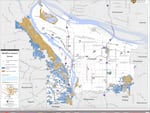On Wednesday, Portland City Council unanimously approved fire bureau protocols that aim to keep homeless individuals from camping in large forested swaths of the city during wildfire season.
Following a dramatic uptick in fire calls related to outdoor camping, Commissioner Jo Ann Hardesty, who oversees the fire bureau, asked the city fire marshal in April to figure out a humane way to get the numbers down. The fire bureau returned with two proposed protocols it believes will reduce the risk of a devastating blaze.
The first protocol will dispatch outreach teams to high-risk zones where a single spark from a fire pit or a cigarette butt could lead to a destructive urban wildfire. These efforts will take place during wildfire season or when Multnomah County declares a burn ban. Outreach teams will warn campers about the fire risks posed by both housed and unhoused Portlanders and the dangers of remaining in the area.
If people still chose to stay put, the city’s Homelessness and Urban Camping Impact Reduction Program will send out teams to evict campers and dismantle campsites.
“I don’t like sweeps, and I don’t like that we have a shortage of housing that people can afford to live in in our city,” Hardesty said at Wednesday’s council meeting. “But as commissioner-in-charge of the fire bureau, I can not stand by and do nothing as people are at risk of dying from fire.”
The second protocol will address camp sites across the city that have a longstanding history of “illegal burning and aggressive behavior to first responders on emergency calls.” It’s not clear which campsites are included in this designation. Derek Bradley, Hardesty’s policy advisor, told the council that the fire marshal has created a tool that will allow members of the public to request information on any campsite and see the number of times the fire bureau has interacted with campers and what problems have been cited there.
In these areas, community groups will first be dispatched to “provide outreach, education, and resources” on how to reduce fire risk. For second offenses, the fire marshal will request that the city evict the campers.
A draft map of the high-risk zones, created by the fire bureau, shows that homeless people will be barred during dry periods from much of the city’s west side, including Linnton Park, Forest Park, Marquam Nature Park and Tryon Creek State Natural Area. On the east side of the Willamette River, the hazard zones include Powell Butte Natural Park, Oaks Bottom Wildlife Refuge and Smith and Bybee Wetlands.

Map of Portland wildfire hazard zones
City of Portland
In May, the latest month for which the fire bureau had available data, the bureau counted 139 “houseless related fires,” a category that includes tent and trash fires. That’s double what the bureau counted in May 2020. Fire officials said many of these fires are the result of people trying to survive: cooking food and lighting fires to stay warm.
Community groups such as Street Roots will be responsible for offering “voluntary relocation assistance,” under the protocols approved by City Council. Kaia Sand, the director of Street Roots, emphasized that outreach workers will not be forcing people to leave. Instead, they will inform people if they are camping in a hazardous zone and give them tips to reduce the risk of starting a fire. She said she’s hoping to work with other homeless advocacy organizations to help her small nonprofit handle the outreach efforts.
After a month of historic heat and dry timber conditions, Sand said, Street Roots has become increasingly focused on protecting Portland’s homeless population from the devastating effects of climate change. But she said she does not support the part of the protocols that would evict people from forested areas without providing an alternative place to go.
“This is the utterly dismal aspect of city policy,” she said. “If it were actually a fully realized policy, they would have places where people could actually safely camp, but whenever its sweep policy, it’s upheaval.”
Hardesty’s office has briefed some community organizations on the protocols being considered, including the ACLU, Stop the Sweeps and the Oregon Justice Resource Center.
Franz Bruggemeier, an attorney with the Oregon Justice Resource Center, said he is concerned the protocols are overly broad, barring people experiencing homeless from huge sections of the city.
Benjamin Donlon, with Stop The Sweeps PDX, said he shares these concerns about cordoning off most of the city’s green areas. And, while he said he sees the need to address fire risk for both housed and unhoused Portlanders, he questioned how much impact outreach workers could have before the city sends in teams to dismantle the campsites. According to an impact statement presented with the protocols, Hardesty’s office hopes to achieve “broad voluntary compliance.”
“They have good intentions of sending out outreach workers to work with people,” he said. “But at a certain point they’re going to hit a threshold, where that person is resistant — and given that this is America and a lot of people are very independent about their individuality, they’re going to meet that resistance — and then what happens?”
Hardesty said she plans on returning to council sometime this winter with a permanent city code change that would tackle the question of how to reduce the fire risk posed by encampments.
